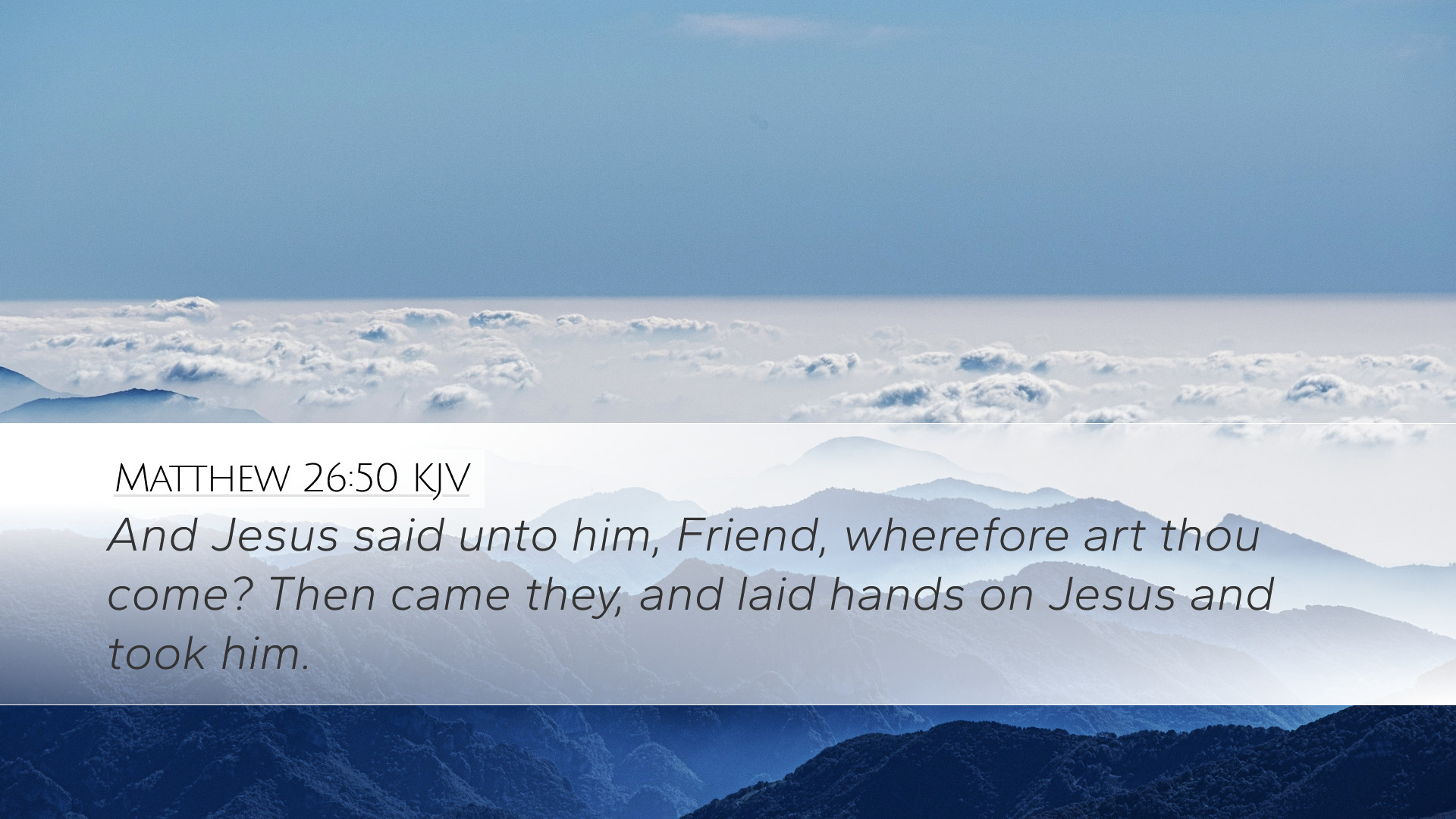Bible Commentary on Matthew 26:50
Verse Reference: Matthew 26:50 - "And Jesus said unto him, Friend, wherefore art thou come? Then came they, and laid hands on Jesus and took him."
Introduction
Matthew 26:50 is a pivotal verse in the narrative of Jesus' betrayal and arrest, highlighting the transition from ministry to the impending crucifixion. This verse encapsulates the profound layers of friendship, betrayal, authority, and divine purpose. Commentaries from notable theologians such as Matthew Henry, Albert Barnes, and Adam Clarke provide deep insights into its implications.
Contextual Analysis
To fully understand Matthew 26:50, one must consider its context. Occurring in the Garden of Gethsemane, this moment follows Jesus' prayer and His disciples' ensuing sleepiness. Judas, having conspired with the chief priests, arrives with a multitude to betray Jesus with a kiss.
Commentary Insights
1. Addressing Judas: "Friend"
Matthew Henry notes that Jesus addressing Judas as "Friend" reveals a profound moment of grace and mercy. Despite Judas' betrayal, Jesus offers him dignity in His address, emphasizing the depth of divine love. This suggests the Christological view that even in betrayal, love prevails.
2. The Significance of the Kiss
Albert Barnes accentuates the symbolic nature of the kiss as a demonstration of betrayal. The act of a kiss signifies affection and loyalty; thus, using it to identify Jesus exemplifies the hypocrisy of Judas' actions. It forces the reader to ponder the nature of true loyalty versus betrayal.
3. Questioning Judas: "Wherefore art thou come?"
Adam Clarke expounds on the question Jesus posed to Judas, highlighting it as a moment of confrontation. This inquiry pierces the heart, bringing Judas face to face with the reality of his actions. It reflects Jesus’ authority that calls for self-examination and recognition of one's true motives.
Theological Reflections
1. Divine Sovereignty and Human Responsibility
This verse illustrates the tension between divine sovereignty and human responsibility. While Judas exercises his free will in betrayal, Scripture presents this act as part of the predetermined plan of God. Matthew Henry points out that God's plan accommodates human actions, even those of disobedience, to accomplish divine purposes.
2. The Nature of True Friendship
By addressing Judas as "Friend," Jesus redefines the nature of friendship. In the context of betrayal, Albert Barnes urges readers to reflect on genuine relationships—what it means to truly follow Christ amidst adversity. Jesus’ compassion towards Judas teaches that love must endure even deep betrayal.
3. The Contrast of Light and Darkness
The scene encapsulates the battle between light and darkness as Jesus stands amidst a growing night of despair and betrayal. This struggle is emblematic of the Christian experience, where believers confront the reality of sin and the need for redemption. Adam Clarke ties this to the larger biblical narrative of struggle against sin.
Practical Applications
- Examine Relationships: Pastors and leaders should encourage congregations to evaluate their relationships—are they rooted in genuine love and loyalty or veiled betrayal?
- Grace in Betrayal: Professors and students in theology can engage in discussions on how grace is manifested in relationships, even when faced with betrayal.
- Facing Confrontation: Believers should be prepared for self-examination, reflecting on Jesus’ subtle yet direct question to Judas, challenging them to confront their failures and weaknesses.
- Reflecting on the Nature of Christ: Theologically, this moment invites reflection on the character of Christ—how He embodies grace, authority, and love juxtaposed against human failure.
Conclusion
Matthew 26:50 serves as a sobering reminder of the complexities of human emotion and divine purpose. Through the lens of public domain commentaries, we gain insights that illuminate Jesus’ unwavering grace amid betrayal, encourage self-examination of our motives, and challenge us to embody true friendship as reflected in Christ’s example. As we reflect on this narrative, may it deepen our understanding of our own relationships with Christ and one another.


